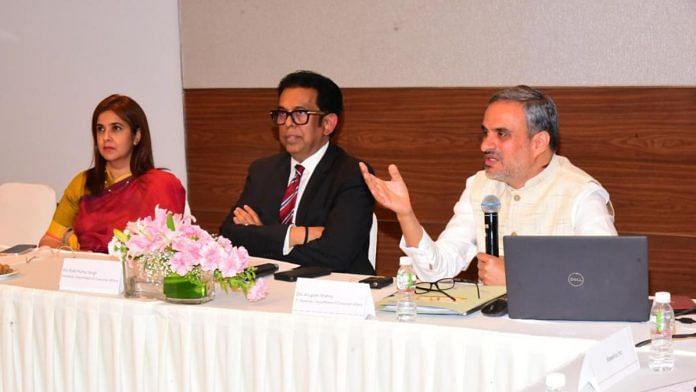New Delhi: In a collaborative effort, the Department of Consumer Affairs (DoCA) and the Advertising Standards Council of India (ASCI) have decided to explore self-regulatory frameworks to check “dark patterns” in Indian advertising, where companies use unethical practices to fool customers.
Guidelines on this are expected to be released within two months, the authorities said in a release.
This decision was a result of an interactive consultation with “industry stakeholders and top executive from nearly three dozen platforms and industry heads” such as Flipkart, Zomato, Amazon, Meta, Google, etc. and the Retailers Association of India, NASSCOM, ONDC and Khaitan & Co. that took place in Mumbai on 13 June.
“Dark patterns” refer to manipulative marketing techniques that deceive customers via a wide range of unethical practices such as creating a false sense of urgency over a purchase, nagging, subscription traps, sneaking items into the checkout basket of online customers, disguised advertising, increasing prices at the time of checkout, etc.
Anupam Mishra, Joint Secretary of Department of Consumer Affairs, elaborated on how these patterns were built with the purpose of restricting and exploiting user autonomy and decision-making.
Some of the consequences of these tactics were “unintended purchases, addiction and overuse and privacy violations”.
Meeting chair and DoCA Secretary Rohit Kumar Singh said in his address to stakeholders Tuesday that protection of consumers was a paramount concern to DoCA. He added, “Deceptive patterns that manipulate consumer choice and impede their right to be well informed constitute unfair practices that are prohibited under the Consumer Protection Act 2019.”
He also clarified that “consent by deceit is not an express consent” and that customers should not have to suffer because of misleading advertisements.
DoCA’s concern with these patterns was rooted in the rapid expansion of the Indian online space.
Given the “strong adoption of online services like eCommerce and edtech”, the country’s consumer digital economy is expected to reach $1 trillion by 2030.
As these digital spaces now dominate the consumer’s intake of information, goods and services, the manipulation of UI/UX design and online choice architecture guiding consumers can cause massive harm to the consumer, the release said.
CEO and Secretary General of ASCI Manisha Kapoor echoed this sentiment in her statement: “With e-commerce and social commerce growing at breakneck speed online consumer safety is at the top of ASCI’s agenda. Deceptive patterns in online advertising mislead consumers, ruin their online experience, and erode trust in brands and advertising.”
The central government and the industry, therefore, held discussions to “initiate a public dialogue to raise awareness about the dark patterns”.
There is consensus that industry self-regulation is central to countering these techniques. Multiple categories, such as online shopping, e-ticketing, restaurant and travel, can self-regulate by banning forms of dark patterns, building consumer-friendly digital environments, encouraging regulators, implementing responsible online design practices and holding independent audits to flag and correct dark patterns.
Among the issues discussed in the meeting, user autonomy was also a significant concern. DoCA, ASCI, and the stakeholders suggested that “equipping users with tools and resources” such as browser extensions to detect and block dark patterns, would enable them to make informed choices.
Discussion was also held on encouraging users to report instances of dark patterns and making small and medium-scale merchants aware of the issue.
Self-regulation by the industry is critical in curbing dark practices. As per the release, all parties unanimously agreed to this, concluding the meeting with “the commitment to continue to explore ways to counter deceptive online practices and protect consumers’ interests”.
Also read: 92% advertisements for real money gaming did not adhere to guidelines in FY23, says ASCI report



